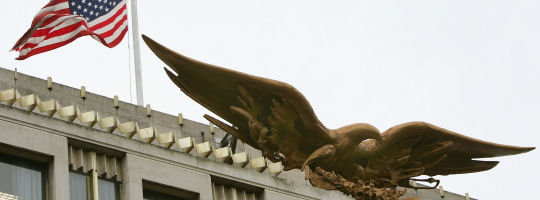
Chairman Obama's,
Paralyzes Greece
Greece problems tied to budget, competitivity: Bernanke24 February 2010,

(WASHINGTON) - US Federal Reserve chairman Ben Bernanke said Wednesday the economic woes facing Greece stem from fiscal and competitiveness issues, but that Europeans were focused on fixing the problems.
"The very serious problem here is not involving only fiscal issues, but also competitiveness issues because of the single exchange rate," Bernanke told a congressional panel when asked about Greece's deep financial troubles.
"But you know, we have talked to the European leaders, they're very focused on getting this problem solved."
Under acute pressure from its 15 eurozone partners, the Socialist Greek government has pledged to slash its deficit this year, agreeing to painful public spending cuts that have sparked a national strike.
Bernanke said that for the Fed, "we are keeping an eye on it, but the Europeans of course, it's most relevant to them and they're most exposed to those problems. And they're very focused on trying to get them under control."
On Wednesday, police fired tear gas and clashed with youths as tens of thousands protested in Athens, Thessaloniki and other main Greek cities against the austerity measures to tame a public debt crisis.
ATHENS — Flights at Greek airports were canceled, public transportation was halted, and schools closed Wednesday as public-sector employees and private-sector workers walked off their jobs in the second 24-hour strike in two weeks against austerity measures.
The government is under intense pressure to plug a budget deficit that equals 12.7 percent of gross domestic product and to avert the first national default among the 16 countries that use the euro.
The day was largely peaceful, though police officers fired tear gas to disperse around 50 young demonstrators who pelted them with stones and paint near the Parliament building in the city center. They were part of a crowd of more than 20,000 who marched holding banners reading “tax the rich” and “hands off our pension funds.”
At the same time, government officials and representatives of the European Commission, the European Central Bank and the International Monetary Fund were discussing the imposition of additional measures to reduce the national debt — now more than $400 billion — and increase revenue. But the strike included journalists, effectively creating a media blackout that kept Greeks in the dark about any progress.
Greece has already announced wage freezes, bonus cuts, tax crackdowns and pension reforms over the past month meant to save some $6.7 billion.
The new measures, which the government has not yet confirmed but are expected to be announced next week, include a 2 percent increase in the 19 percent value-added tax, higher fuel prices and the possible abolition of one of two additional months of pay received by public-sector workers and by employees at many private firms.
“What else are they going to cut, the air that we breathe?” said Kiki Oikonomou, a 47-year-old administrative employee at a state school for disabled children. “This is like a jail sentence. Where’s the hope?”
According to Paraskevi Androni, 26, an unemployed engineer whose short-term contract with the privatized state carrier Olympic Air expired recently, the abolition of the extra pay would bring misery to workers and businesses alike.
“People rely on this additional wage to pay for basic needs,” she said. “If it gets cut, people will stop spending and even more small businesses will close.” As for her own employment prospects, she said “I try to be optimistic but I’m worried about the future.”
Another engineer milling in the crowd before Wednesday’s march said he believed many more protests would follow. “If people see the minority living a good life and their wages plummeting, they’re going to take to the streets,” said Haralambos Dramantis, a 60-year-old employee with the state power board. “We haven’t seen the big uprising yet but it will come.”
He added that strikes by farmers, tax collectors, customs officials and others in recent weeks were “just the beginning.”
Addressing a sea of protesters from a lectern bedecked with a banner reading, “People and their needs above the markets,” the head of main labor union encouraged public resistance to the government’s austerity measures. “We refuse to pay the price for a crisis that we didn’t create,” the leader, Yannis Panagopoulos, said.
He added that Greece has become “a Ping-Pong ball in a game being played by global speculators,” a reference to the financial markets.
The strike came a day after the international credit ratings agency Fitch downgraded Greece’s four largest banks on fears that Greece’s efforts to bring down its deficit through austerity measures would reduce demand for loans and curb bank profits.
“It is clear,” said Giorgos Lakopoulos of Ta Nea, a center-left daily, that European Union officials “do not believe the austerity measures heralded to date are adequate to reduce the deficit by four percentage points this year.”
“They want more,” he said.










 treaty is an excuse to delay action on the nuclear programme.
treaty is an excuse to delay action on the nuclear programme.
